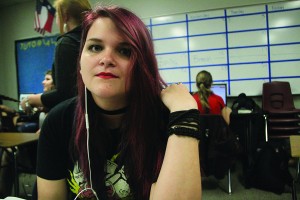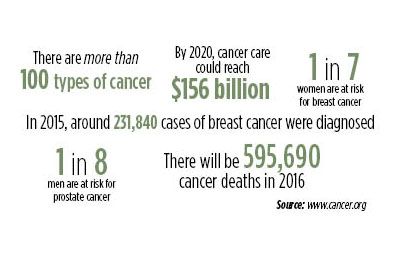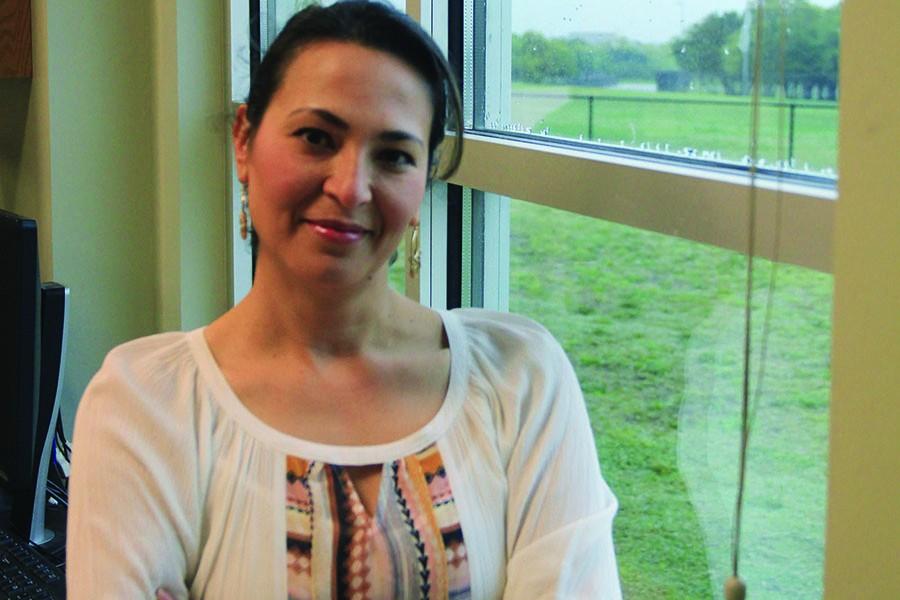I’m a Survivor
Two teachers and a student share their battles with cancer and how they’ve carried on
Five years ago, Biology teacher Fabiola Escalon found a lump in her breast. The breast cancer scare has made her a stronger person now.
This year alone, there will be 1,685,210 new cases of cancer diagnosed. Almost 600,000 people will die in 2016, according to the National Cancer Institute. Three people in the school community have survived this deadly game.
“My mom and I found a lump on my head awhile back,” freshman Victoria Des Parois said. “Maybe around four years ago, and recently it started hurting, like it was throbbing and hurt to touch.”
When Des Parois went to the doctors they told her it looked like melanoma, a type of skin cancer. They are like moles, but more painful with cancer cells in them. She had two of them.
“They told me I would have to get surgery to remove them,” Des Parois said. “When they were cutting into my scalp there was just a lot of noises, and it was nasty when the skin was popping.”
Des Parois had her friend Josh, mom, and sister to get through it. Her other sisters didn’t know about it, but her main family knew and her mom was in the surgery room with her when they were removing it.

Freshman Victoria Des Parois had two melanoma spots removed on her scalp.
“Don’t be scared,” Des Parois said. “It’s not that bad it’s just if you have it on your head it’s going to be scary because you think the doctors are going to cut into your brain, but they don’t. Instead they cut on the scalp, digging really deep into your head, but not in your brain.”
The doctors don’t know if Des Parois is fully cleared. She has to wait another five months to until she finds out.
Biology teacher Fabiola Escalon also made her cancer discovery, finding it by accident.
In 2011, Escalon was putting her daughter to bed when she had the urge to cough. Trying to keep herself from waking the sleeping child, she put her hand on her chest and made a startling discovery.
“I put my hand to my chest trying to keep myself from being loud while coughing, I put a lot of pressure on my hand and I felt a lump, like a little rock, something hard,” Escalon said.
Escalon made a doctor’s appointment, but was dismayed with the lack of information and help.
But the doctor’s office wouldn’t give her the official results without the doctor viewing them. Escalon called day after day, even going to the hospital where her mammogram was done to pick up the results. She Googled the results and found it said ‘cancer, very high potential.’
Escalon began to look for another doctor, giving them the results from the first doctor.
“They were very nice and they took me in,” Escalon said. “He took them Friday, and I called the first doctor and asked them if the doctor has seen the results. The nurse said he doesn’t work on Fridays. I said that it was okay and I that I didn’t need their service anymore. Going through this you want help right away, and finding good care is a must.”
By Monday, Escalon went to the second doctor and did a biopsy.
“The biopsy was very painful,” Escalon said. “There’s no anesthetics and you’re just going in with a needle and to suction out a very, very small piece of the tissue, just the cancerous tissue. By March 2, 2011 I was told it was for sure there. It was a positive test I had cancer.”
In the middle of March, Escalon started chemotherapy. She cut her hair before it fell out and after her first time she could hear her hair falling.
“Imagine you’re in a forest,” Escalon said. “And you hear leaves falling off the trees and branches breaking off. That’s what I was experiencing. I could feel the hair follicles cracking.”
For three months Escalon had strong chemotherapy, then the next few months she had a lighter chemotherapy. Then surgery in October. She had a double discectomy. Then recovery.
“The hard part was the beginning by not getting the help,” Escalon said. “The chemo honestly was very traumatic because it changes your body and a lot of stuff changes inside you. I can’t think the way I used to, I don’t have the speech vocabulary I used to. I’m sure I lost IQ points as well, and I’m more anxious, I’m a different person absolutely. I lost a lot of memories because of the chemo. My brain is fried, but I’m here and I’m talking about it.”
Since Escalon was a teacher at the time she had teachers, friends and students to help her out. She had her mom for support, but her kids were young and they needed support too. Mostly Escalon got help from the outside.
“Have faith things will get better,” Escalon said. “There’s a lot of help out there. But you do need to look for it. You always want to have the best doctor care possible because it does make a difference. You will get through it and there’s a lot of good medicines.”
Five years later, Escalon is cancer free, but she still worries.
“I do worry a lot,” Escalon said. “I worried more than now since it’s been five years. I guess I don’t worry 100 percent of the time, but if I get sick or a get headache I wonder if it’s it. So that’s where the anxiety comes in. It gets easier over time. It’s always in the back of my mind. So no, I’ve never had closure.”
AVID teacher Andrea Wichman has also faced the cancer battle. In 1997 at a routine checkup, Wichman’s doctor found a lump in her chest. The biopsy showed it was breast cancer.
“They took out a chunk where the cancer was,” Wichman said. “It was a really small tumor, so they weren’t too worried. They told me it was small and it shouldn’t be that big of a deal, then I went in and had then CAT scan and bone scan and whatever other scan they made me do. Every time I went in for another scan they found the cancer somewhere else. It moved to my spine, it moved to my hip, and they said originally it was just a stage two cancer so they bumped me up to stage four because it already spread so fast. Then they told me I would live five more years.”
Wichman had stem cell transplants, at the time an experimental procedure. She spent 41 days at the Baylor Medical Center in Dallas where they took the stem cells out and gave her extremely high doses of chemo, aiming to kill the good and bad cells. Then they put the stems cells back in her. The goal was to build a whole immune system to fight the cancer. A benefit Wichman went through was her allergies disappeared when they put the stem calls back in.
“The transplant kept the cancer away for about nine years,” Wichman said. “I would go every three months to do blood tests. It seemed to be keeping it away. In the meantime however I got thyroid cancer. My doctor told me it was the best cancer to have because it’s curable and it’s the easiest to take care of.”
 Wichman had radioactive iodine treatment for the thyroid cancer. They took her in a little room and came in wearing thick clothing. Then she was given a small pill she had to take. Once she took it Wichman had to sit in the room for 20 minutes.
Wichman had radioactive iodine treatment for the thyroid cancer. They took her in a little room and came in wearing thick clothing. Then she was given a small pill she had to take. Once she took it Wichman had to sit in the room for 20 minutes.
“They came back with a Geiger counter,” Wichman said. “Which is what scientists use to detect radioactivity. The closer they came to me the louder the Geiger counter went off. Then they tell me I’m radioactive I need to stay away from people and dogs. I had to drive myself home, I couldn’t sit next to my husband, I couldn’t have my dogs next to me. I had to stay in a bedroom in my house for a whole week while this radioactivity wore off. So I would yell ‘I need to go out and use the bathroom.’ And everyone would have to leave. Or ‘I’m hungry, can I go to the kitchen?’ And everyone would leave so I could get something out of the kitchen.”
It took a week before Wichman was cleared to be around other people. The AVID teacher says that cancer was easier to deal with. She had high doses of chemo with the breast cancer that caused her to lose all her hair, eyebrows, eyelashes, and the hair on her legs and arms.
“Just looking at myself was hard,” Wichman said. “A few years after that, unfortunately, my breast cancer came back to my brain. I knew that because as I was walking I would lose my balance and I would start bumping into walls, and I’m clumsy anyways so at first I was just clumsy, but it started to get worse and worse. Then the side of my face got numb and my hands got numb and I went in and the doctor didn’t know what it was.”
The doctor’s first thoughts were sclerosis, but when they did a brain MRI on Wichman they told her not to drive home. She had a plum-sized tumor real close to her brain stem they couldn’t figure out what it was, but they were pretty sure it was cancer. Wichman went to many doctors, but they couldn’t operate because of where it was. She would lose too much blood.
“They sent me to a radiologist,” Wichman said. “He was funny. I went in there of course scared to death. I talked to this radiologist and I was sitting in the little doctor’s room and he came in wearing cowboy boots and a Hawaiian shirt, he wasn’t your typical doctor. That was just so good for me, I liked it and so he asks me what was wrong and what he could do for me and of course I start crying. I hand him my scans and he looked at them then he called in a couple people in and you could tell nobody knew. He told me he would try to help me, but he couldn’t make any promises. That was in 2008. It’s been eight years.”
Wichman went to downtown Austin to his office every day for 30 days. They made her a mask and laid her on a metal table. Using the mask they did a specific radiation that went right to the tumor and here she is today.
“At that time they did not know how to treat aggressive breast cancer,” Wichman said. “I was just lucky to get that cell transplant and that it kept it away for so long. Then in 2008 when it was in my brain my doctor told me I need to get my will in order because there was no promise it would work and here I am.
Wichman works only on B days. She’s eating right, exercising, and taking care of herself. She thinks the stress of a teacher contributed to the cause of her cancer.
“I have a wonderful husband,” Wichman said. “My husband is my rock. When I was at Baylor getting the stem cell transplant there were weeks where I had fluid coming out of every orifice of my body. My nose was bleeding and I was throwing up, but he helped me, he took care of me. When he went back to work my mother and my dad came helped too. He’s been through everything with me and I’m really happy to have him as my husband.”
Keeping a positive attitude and the will to talk about it is helpful. Wichman had her moments of feeling down, but she knew that in the end it would all be worth it.
“I try to have fun with what I have,” Wichman said. “Use your disability or whatever it is to your benefit.”



